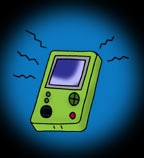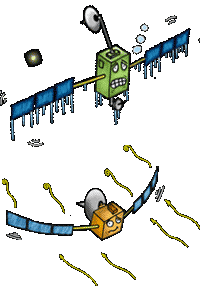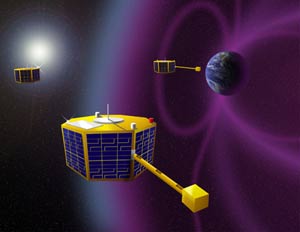
The
new lithium-ion (Li-ion for short) batteries to be tested in
space are SO good and SO long-lasting . . . Find out just how long your Li-ion batteries would last: How nice that we don't have to plug everything into the wall to get electricity! |
|
|
Wouldn't it be nice to have batteries that last many years? One place such a battery would be very handy is in a spacecraft. Most spacecraft do not have people onboard. If the batteries fizzle, the whole spacecraft fizzles. There is no one to replace the batteries in a spacecraft that's millions of miles away! Even though batteries may work fine down here on Earth, space is another matter . . . or rather, lack of matter!
Batteries now being used in space are the rechargable kind, usually nickel-cadmium (or Ni-Cad). They are recharged by solar cells that convert the sun's energy to electricity. However, these batteries eventually wear out and no longer can be recharged. Lithium-ion (or Li-ion) batteries are a newer kind. The chemicals inside them that store the energy are different from Ni-Cad batteries. Li-ion batteries store a lot more energy in a smaller space. What's more, Li-ion batteries can be recharged many more times. Space Technology 5 (ST5) is a space mission that will test just how well these long-lasting Li-ion batteries work in space.
|
|
|
In the space business, smaller is usually better. It is much less expensive to launch a small object than a big one. Even an extra kilogram (a couple of pounds) takes a lot of rocket fuel to boost into space. And, of course, the extra fuel makes the rocket itself heavier so it takes even more fuel to get off the ground! ST5 is part of the New Millennium Program, which sends missions into space to test brand new technologies. This way, we can keep going places we've never gone before and discovering new things no one could ever have imagined. |
|
|
|
|||||
 Space
Batteries!
Space
Batteries! if
you put them in your hand-held electronic game, you might
never have to buy batteries again!
if
you put them in your hand-held electronic game, you might
never have to buy batteries again! But
batteries often die at just the wrong time. Flashlights fade
away when you need them most. Toys that keep going and going
. . . do finally quit.
But
batteries often die at just the wrong time. Flashlights fade
away when you need them most. Toys that keep going and going
. . . do finally quit. In
space, batteries must work in both very hot and very cold
conditions. They must withstand a lot of radiation from the
sun. They must work in a vacuum without leaking or blowing
up! They must be rugged enough to withstand the severe
vibrations of a rocket launch.
In
space, batteries must work in both very hot and very cold
conditions. They must withstand a lot of radiation from the
sun. They must work in a vacuum without leaking or blowing
up! They must be rugged enough to withstand the severe
vibrations of a rocket launch. ST5 will fly three tiny, birthday-cake sized spacecraft in
formation around Earth. Besides the Li-ion batteries, the
three spacecraft will test other advanced technologies that
let space engineers stuff a lot of cleverness and capability
into a very small package.
ST5 will fly three tiny, birthday-cake sized spacecraft in
formation around Earth. Besides the Li-ion batteries, the
three spacecraft will test other advanced technologies that
let space engineers stuff a lot of cleverness and capability
into a very small package.




